
On October 28, the new Cowan Lodge is dedicated. Built at a cost of $50,000 donated by the University Christian Association, the property is now called the Christian Association Conference Center. The fireplace and mantle of the new structure is dedicated to Helen Hare Sholl, a graduate of the Class of 1910, and President of the Bucknell Mothers' Association, and her. The center has overnight accommodations for 60 persons and is used for dinners, conferences, picnics, and sports activities. In September, the new facilities are used for the first time as a Freshman Camp. Ten years later the building is renamed the Forrest D. Brown Conference Center, in honor of the General Secretary of the Christian Association for 36 years.
Buildings and Areas Notebook, Bucknell University Archives
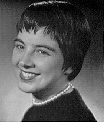
Recollection
Bobbi Folk Mynott graduated from Bucknell in three years on the Dean's List as a member of the Class of 1956. She received a degree in Commerce and Finance with a minor in Biology and ended up working for the medical director in a laboratory. While a freshman at Bucknell, she met her husband-to-be, Geoffrey Mynott (a senior at the time), who now serves as a member of the Board of Trustees. Mrs. Mynott recalls that choosing to attend Bucknell took a lot of convincing of her father, who, "being from a small town in the south, felt that young women at that age should maybe go to finishing school, find a husband, settle down and their career should be home and hearth. . . My determination to get my degree came from a subconscious realization that I needed to become independent from my family." Although she did get married two weeks after graduating, Mrs. Mynott also got a job. During her time at Bucknell, she feels she had a strong sense of women's roles in leadership. "Women authority figures, such as Mary Jane Stevenson, had a more nurturing role. Besides just having the usual concern with academic standards, she also cared about what happened spiritually. Peg Bryan, in charge of extracurricular activities, always emphasized the importance of having fun, even in competition." Hulda Magalhaes is another she recalls. "Although I found her quite intimidating at first, I had learned her discipline. I admired her discipline, she was exact in letting you know exactly where you stood." The one thing Mrs. Mynott feels that she gained and stayed with her the most was "the growth that was made possible and continued to be possible through Bucknell. Dean Stevenson continued to reach out to me and urged me to become active in the AAUW. (American Association of University Women)." Mrs. Mynott has been involved with the Philadelphia alumni club, the Ellen Clarke Bertrand Society, and various capitol campaigns. In 1993, she and her husband, a University Trustee, received the Bucknell Alumni Association award for outstanding loyalty and service to the University.
WRC Interview, 1995
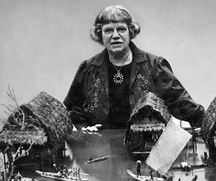
Mead, Well Known Anthropologist
To Lecture, Wednesday Evening
by Virginia Emmitt
Well-known anthropologist, Margaret Mead will speak at Bucknell, Wednesday, May 8, at 8 p.m. in Davis Gym Annex. Although the lecture is sponsored by WSGA, it is presented for all interested students, faculty, administration, and townspeople.
Dr. Mead is especially famous for her work with primitive tribes in the southern pacific area. The majority of her work has been done to prove her theory that most human traits and development processes are culture-determined. To develop her ideas, Dr. Mead lives with the peoples she is studying.
The Bucknellian, 5/2/57
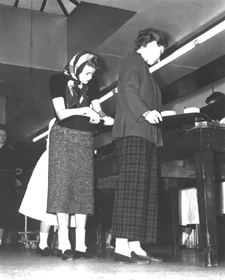
Dorm Life - All women dine in Larison.
L'Agenda 1957

Recollection
Joanne Grittner Weibel, class of 1957, recalls how students responded
to the curfew for women: "I can remember the pile up in front of Larison,
on a Saturday evening at 11:30, just kissing and hugging. . . it was just,
just, well it should have been a movie, because it was so funny. At the
last minute everybody made a beeline for the door."
The cartoon caption says: "I usta have so much trouble getting them in
at closing hours--will you turn on the water, Mae?"
WRC Interview, 5/96
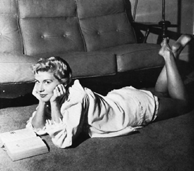
The Bucknell Engineer continues its pin-up tradition.
"The pensive young lady on these pages is Miss Jeanne Ferris, our latest "Engineer's Choice." She is a 20 year old (class of '59), from South Orange, N. J., and is majoring in French and Political Science.
Jeanne, as active as she is attractive, is a French House V. P., Bucknellian Circulation staff member, and fashion writer for a local women's apparel store. Her hobbies include horseback riding and swimming, with a little modeling occasionally -thrown in. Adjectively speaking, Jeanne is a 5' 4 1/2", 116 pound, green-eyed, "36-22-36" 'ed blond - - - need we say more?"
The Bucknell Engineer, January 1958
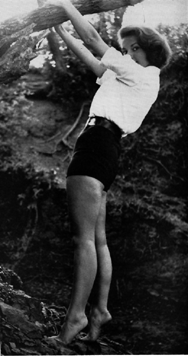
Another co-ed selected as the Engineer's Choice was described this way:
'S', students, stands for 'sophisticated', 'saucy', and sometimes even
'sexy'. Illustrating these slippery syllables is Miss Kris Diaz, a soc.
and psych. specializing "soon-to-be-sophomore" from New Rochelle, N.Y.
Kris' combination of swimming, golf, and Bucknellian writing, engineered
to fill study breaks, also seems to keep a 35-21-35 combination rather
well organized, hmm? Sound satisfactory, students? See for yourselves.
Illustrations and story by Herb Bohler
The Bucknell Engineer, May 1958
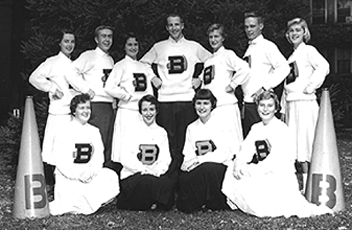
The cheerleaders of this period project a wholesome college image as they support Bucknell teams.
L'Agenda, 1958
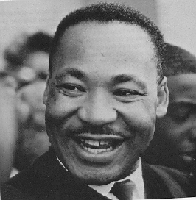
Martin Luther King Describes Full Living
Dr. Martin Luther King, president of the Montgomery Improvement Association,
spoke Wednesday at Chapel. Given world-wide recognition in the Anti-Segregation
Movement of Alabama, Dr. King is furthering the opportunities of the Negroe
in the South. He received his A.B. degree from Morehouse College and is
a graduate of Crozier Theological Seminary. He qualified for his PH. D.
in Philosophy at Boston University.
Dr. King's talk, "The Three Dimensions of a Complete Life," followed the
theme that life must be three-dimensional in order to be complete. The
first dimension is the length of life or concern for rational and moral
self-interest. According to Dr. King, "when we do life's work so well
that no one else could do it better, we have filled the length of life."
The second dimension, the extension of life to others, involves the capacity
for "dangerous costly altruism" similar to that exhibited by the Good
Samaritan. Dr. King pointed out that every object in our daily life is
dependent upon other persons and other parts of the world. It is not enough
that our lives have length and breadth. We must reach up and discover
God, the third dimension of height.
Dr. King described our civilization as "sensate," having no place for
things we cannot discover through one of the five senses. "We can never
see all the great things of life, although they exist all about us. We
must seek and develop a relationship with the eternal source of reality."
Thus, such a relationship with God will give us inspiration to keep going,
added Dr. King, giving examples of his own work with segregation in Montgomery,
Alabama.
Dr. King concluded by saying that we must love the Self to gain length
but must not stop there. We should "Love thy neighbor as thyself" to gain
breadth. The fulfillment of a complete life is an upward reach to God
achieved by loving "The Lord thy God, with all thy heart, soul, and mind."
Every life must have this sky.
The Bucknellian, Jan Powers, May 1, 1958
Marilyn Mumford obtains a Master's Degree in English from Bucknell and begins teaching here in the fall. Shortly thereafter she marries a member of her department and because there is an unwritten policy that spouses are not both to be employed at the University, her status remains as an instructor. She recalls, "I was called in and told that I would not be promoted, that I was on a year to year contract, and that there would not be an alteration in that status. In fact, that status went on for 14 years at the outset of my career, and had the effect in some ways of crippling my career because I wasn't able to teach advanced courses."
WRC interview, 8/95
Recollection
Brad Tufts, Assistant Director of Athletics, was hired in 1959 as Sports Information Director and reported to Trennie Eisley, Director of Public Relations. He recalls Trennie was a terrific person, Bucknell was her life; it was her big family. Trennie was a terrific teacher and boss. 'I think much of what Bucknell is today or the image of what Bucknell is today-a lot of it is due to Trennie's work. She oversaw all the publications the university did at the time: catalogues, recruiting pieces, any other publications; she oversaw them all and wrote many of them. While there is a lot more being done today, the Public Relations Office is three times as large and outside people are brought in to do design work. Things are glitzier, the times require that today. But she laid a great ground work. She taught me about writing my first few news releases. In her very nice way she asked me to show them to her before I sent them out, and she'd catch me some stuff. For as long as worked for her whenever I had some question about something I wrote, I had no hesitation running it by her desk. It was really great!'
WRC Interview, 12/15/95

1960 Vitamins are their business! Few students realize the amount of organization and planning involved in preparing the "three squares" they are served each day, through the efforts of Mrs. Esther B. Long, director of the University Food Service, and Miss Mabel Pluemacher, the dietician.
L'Agenda 1960

1960 These nurses make the best square corners and administer the most painless shots in town! Easily accessible at the far end of Larison is the Women's Infirmary. It is staffed by Miss Dorothy Burmeister, Miss Elsie May Hoffman, and Miss Marlene Hendershot whose duties include dispensary work and bedcare.
L'Agenda 1960
Marthann Lauver (Martie Samek) graduates early with a degree in Education. She is an active student who has been on the Dean's List, a member of the yearbook and newspaper staffs, Cap and Dagger, and the Women's Student Government. She is also selected as Junior Counselor and head resident for Sixth Street House.
Mrs. Samek, in thinking about regulations for women recalls, "We were not allowed to wear pants on dates. We were not allowed to wear pants in town." On very very cold day, these rules were suspended. "There were several other cardinal sins. One was chewing gum in town or on campus, and certainly, never, ever smoking on the street."
Before graduating, Martie is called into the Registrar's Office and told she has not fulfilled the required number of chapel credits. She has enought academic credits to graduate early, but did not complete the 40 chapel credits necessary to get her degree. University officials meet and agree to allow her to receiver her diploma as long as she promised to attend church and the pastor of her new congregation will vouch for her attendance.
A self-described "professional volunteer," Mrs. Samek later serves on the Bucknell Parents Board and the Northern New Jersey Alumni Club. After becoming President of the Alumni Association in 1992, she will join the University's Board of Trustees a year later. Martie's husband, Edward, and her three daughters, Ann, Margaret, and Elizabeth are also graduates of Bucknell.
WRC Interview, 11/95
"I'll never forget that trip if I live to be 100," Dr. Mildred Martin remarks about her 58-day bus ride from Paris to Bombay. "The fantastic safari, made by 60 people in three 20-year old buses, was part of a five-month trip around the world which the Professor of English began late in January and finished in July. In almost every country Miss Martin visited, she was met by foreign students she had learned to know at the Bucknell Summer Institute and their hospitality was unforgettable." Dr. Martin shares descriptions of her journey to 23 countries with the Bucknell Campus Club and other groups.
Union County Standard Journal, 7/14/60
A unique breed of hamsters being raised at Bucknell under the direction of Dr. Hulda Magalhaes, Professor of Zoology, may someday provide medical science with important answers in its research to conquer cancer. The biology department is supplyng the National Institute of Health in Washington, DC, with hamsters descended from a strain of hamsters with "spontaneous abnormalities," missing kidneys or reproductive tissue, these hamsters are more susceptible to cancer-producing factors. Dr. Magalhaes is shown here with the first hamster cage which she constructed.
The Bucknellian, 1/60